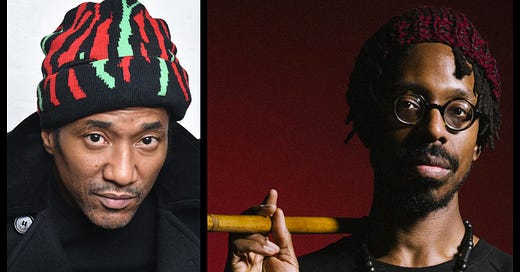In Praise of NOTAFLOF | Bklyn Sounds 9/4/2024—9/10/2024
About “No One Turned Away For Lack of Funds” + This Week's Shows Include: Shabaka / Bread & Puppet Theater / Patricia Brennan Septet / 'Flowers: In Appreciation of Q-Tip' / Lollisse / + 16 more

Before the events of 2020 that shaped the ensuing pandemicine, “No One Turned Away For Lack of Funds” was not a phrase I was familiar with, nor did I recognize its more prevalent and cryptic acronym. There’s really no reason why either should have been notable before I set off writing Dada Strain, about events that were predominantly taking place in third spaces outside of institutional or corporate control.
NOTAFLOF’s immediately identifiable cultural politics—welcoming audience-members unable to afford an event’s door/ticket fee—had been a central tenet of the DIY community I’d dipped in’n’out of prior to the werk of this newsletter, acting less as a knowing participant than journalistic interloper. The idea made instant sense, but it also translated as a niche value. Yet if there’s anything the last four years has taught me, it’s that the “obvious” in niche values is often a guiding light when applied more broadly. A constant reminder that niches and margins are where great ideas about cultural futures have always emanated from. And the more I considered NOTAFLOF, the more it made sense not as a crusty punk-hippie commandment, but as a way forward for musicians, audiences and musickers looking to build community economic foundations that helps us all survive.
It should come as no surprise that (to the best of my research) NOTAFLOF is a term and rule that blossomed in the DIY and queer communities of the West Coast. The earliest citation of the phrase I was able to find was the acronym’s definition (“new vocabulary word”) in a discussion of “sliding scale” and a rejection of the idea that “financial contributions are more valuable participation.” The post was on the website of THE FáBRICA, a community arts and textiles workshop in Santa Cruz, CA which remains open. The site’s citation that the word was “new” hints its origin as likely having been around that time. (PS: If anyone has any earlier uses of NOTAFLOF, or other insights into its history, PLEASE send them my way.)
The words next major online flare comes in February 2016, in a write-up about the funding of Serendipity, a North Oakland pay-what-you-can haircuts and bodywork community space that opened in the face of East Bay gentrification, and which prioritized queer and trans people of color. “Rather than trying to fend for ourselves and filling up our days hustling to make money from those with more wealth,” wrote Liam Kelly in a Medium post called “Why We Are Crazy Enough to NOTAFLOF,” “we have chosen to work within our community because we see our people in fight or flight and if we don’t do something, pretty soon there will be no community left.” The collective behind Serendipity even named itself after the practice — but closed before the fateful Election Day of 2016, though not before other queer cultural establishments around the Bay Area seemed to have adapted the practice.
By May 2016, Haddasah Damien, a “queer feminist anti-capitalist financial educator” who runs the (then Bklyn- now Denver-based) Ride Free Fearless Money site that advises readers on “progressive economics,” was using the term in her notes on the importance of charging “sliding scale” at working-class-attended events. In her writing, NOTAFLOF appeared next to two other related acronyms: MIYHLIYD (“more if you have, less if you don’t”) and PWYC (“pay what you can”), espousing the virtues of each while encouraging the need to balance maximum involvement with compensation for creative work.
Over the past decade, the tensions and aspirations at play in each of these early uses of NOTAFLOF have only grown, exacerbated by increased income inequality across all industries, and by the app-based economy’s embrace of product-value binaries rather than the contextual sympathies required in community building. It is only natural that in the wake of lockdown and re-opening, of Black Lives Matter protests and subsequent DEI push-back, of a growing embrace of LGBTQI+ culture and transphobic counter-attacks, the tensions between broader participation and traditionally stable profits are ones that would infiltrate every aspect of culture. This naturally includes different ways of how to throw music events, how much they cost, how artists get paid, and how they can play to the biggest audiences possible.
Which brings us to the fact that this past summer has been filled with stories that seem to hint at an impending disintegration of the corporate concert market: huge ticket prices and guarantees, followed by half-empty venues and canceled tours, or even mostly sold-out middle-class tours’ inability to cover costs into profitability. To hear many people tell it, a well-deserved apocalypse in the global touring system is just around the corner. Even the best case scenarios of Big Concert—where attendees score tickets at a percentage of their face-value in order to fill up otherwise empty seats at shows by the likes of Janet Jackson (still kicking myself for not wandering a few blocks down to Barclays) and Missy Elliot (ditto)—are guided not by system but circumstance.
Certainly, NOTAFLOF is unable to fix what happens in arenas: that seems hopeless until the Ticketmaster x Live Nation monopolies are buried, and ticket-resale options are detached from initial sellers, or made illegal. Nor do I believe the embrace of an economically ethical sliding scale will convince smaller venues to abandon the use of endlessly proliferating ticketing apps, and the related scourges of dynamic pricing and personal data resale.
What the expansion of NOTAFLOF can undoubtedly do is help every single small or DIY (or home) (or bar-restaurant backroom) (or any community third space) show maximize its attendance. Which in turn creates options for how artists regard the economics of playing live, and also helps musickers find new ways of creating those shows. It is only through the elevation of alternative opportunities, that producers of traditional live-music experiences will change their way of doing business. Contrary to its low-stakes reputation, NOTAFLOF’s influence is not simply about door policy, the tip-bucket being passed around, the Venmo code being strategically placed around a venue. This is about rethinking where you wanna play, and for whom, of choosing your audiences. One can already sense that, increasingly, people on both sides of the stage are getting aligned.
This Week’s Shows:
Breaking Stretch, the new album by vibraphonist Patricia Brennan’s new Septet, is already one of my 2024 favorites, expanding the attack that made Brennan’s wonderfully rhythmic More Touch so damned good. (Read more about Brennan and More Touch here.) That quartet record added a pair of great drummers (Marcus Gilmore and Mauricio Herrera) to Brennan’s electronically-manipulated vibes; now the attack also features a trio of horns (saxophonists Jon Irabagon and Mark Shim, plus Adam O’Farrill on trumpet and electronics), while Kim Cass holds does the low-end. The polychromatic explosion of horn, rhythm and texture is absolutely glorious. Breaking Stretch drops Friday, but Brennan and her band are celebrating its release a couple of days early at Nublu. Highest Recommendation! (Wed 9/4, 7p @ Nublu, Loisaida - $22)
The British saxophonist-turned-full-time-reeds-player Shabaka has arrived at the Blue Note for a week-long stand. And it is a potential watershed NYC moment for one of the past decade’s crucial musicians. The trio he’s playing in—with drummer Austin Williamson, and trombonist Kalia Vandever—is thematically locked-in, but also consists of great individualist players. Harpists Brandee Younger and Charles Overton, and keys-man George Burton are already scheduled to make appearances (see the schedule). I bet other folks show up too. Who? Check the album, and dig the zeitgeist. Highest Recommendation. (Wed 9/4 - Sun 9/8, 8p & 10:30p @ Blue Note, Manhattan - $35-$52 + minimum)
Legendary English bassist Dave Holland—of Miles’ Bitches Brew band, but also of his own beloved free-jazz and creative-music classics— has a New Quartet. And, oh my, what a band, rounded out by alto saxophonist Jaleel Shaw, pianist Kris Davis and drummer Nasheet Waits. Smoke is the right place for this developmental stand. Because the performances are bound to! <sorry> (Wed 9/4 - Sun 9/8, 7p & 9p + 10:30p sets Fri & Sat @ Smoke, Uptown - $25-$55)
THEATER + POLITRICKS: Dada Strain isn’t likely to ever become the resource for puppetry content, but Vermont’s Bread & Puppet are not your usual puppeteering theater group, and beyond worth your time. Founded in the early ‘60s on the Lower East Side by Peter Schumann as a street-art happening, Bread & Puppet relocated to Northern Vermont in the mid-’70s, where each summer they’ve been staging satires full of oversize puppets about current and historical events, always levied by a healthy amount of agrarian, indigenous ceremony. Humor and soul are its chief ingredients. It’s a circus of bread-baking and art-making radicals that has, over the years, informed lots of global culture, from the Muppets to Glastonbury, whose roots in improvisation and community are unf*withable. They board their hippie buses and come to NYC occasionally, performing at child-friendly environs and times. They should prolly be at a museum, but thankfully, they can’t be bothered with institutional BS. Highest Recommendation! (Thurs 9/5, 4p & 8p @ Old Stone House, Park Slope - $10-$25suggested/NOTAFLOF)
Keep reading with a 7-day free trial
Subscribe to Dada Strain to keep reading this post and get 7 days of free access to the full post archives.


